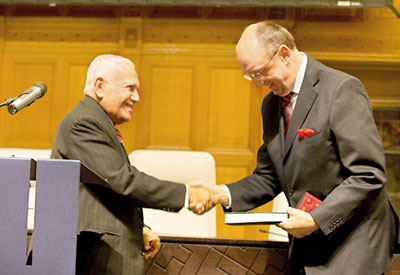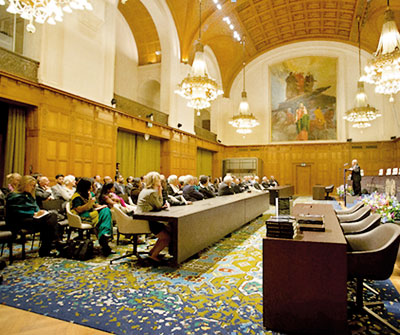Sunday Times 2
Towards one world: The memoirs of Judge Weeramantry
View(s):Volume III of the Memoirs of Judge Chris Weeramantry dealing with his years at the International Court of Justice and thereafter has had a series of launches in Europe. The launch of this work in Colombo will take place tomorrow at the residence of the Ambassador of the Netherlands.
The first launch took place on November 17th in the Great Hall of Justice of the International Court of Justice at the Peace Palace in The Hague. Coincidentally, the launch took place on the Judge’s 88th birthday and the 24th anniversary of his election to the International Court.
The ceremony was presided over by the ICJ President Judge Peter Tomka, who has written the foreword to the volume.
Judge Tomka stated that Judge Weeramantry was one of the foremost legal thinkers of our time.

Presentation of first copy to International Court of Justice President Judge Peter Tomka
He had written a number of outstanding judgments and also contributed greatly to the work and authority of the court.
The book was launched by Dr. Arthur Eyffinger, the foremost living historian of the Court, who has written extensively on the origins and the work of the court. He described Judge Weeramantry as “the architect of modern international law”, referring to various Opinions through which the judge had developed important branches of international law to meet the needs of the future.
A large and distinguished audience was present including Lord Higgins and Dame Rosalyn Higgins, a former President of the court, present and past judges of the court, former heads of state, members of the diplomatic corps, the Mayor of The Hague and representatives of major international institutions at The Hague.
Dr Eyffinger referred to Judge Weeramantry’s efforts to reintegrate global wisdom into international law, thus drawing into it the vast reservoir of wisdom contained in the world’s religions.
He also referred to several verses appended to the volume, in which the judge had sought to encapsulate his philosophy. An example was:
“Let all religions now combine
To pool their wisdom and to shine
The light of their collective grace
Upon the struggling human race”
“The rules on which they all agree
Are there for everyone to see
But to this wealth the world is blind
With grievous loss to all mankind”
He also referred to the fact that when the City of The Hague celebrated its 750th anniversary in 1998, it sought to draw attention to 18 areas in which it had achieved international pre-eminence over the centuries. A search committee was set up to select one personality to represent The Hague’s excellence in each of these areas. From among all the judges who had served on the court, the personality selected to represent The Hague’s excellence in international law was Judge Weeramantry.
Launch at Cambridge University
Four days later the book was launched in England at the Lauterpacht Centre for International Law in Cambridge University.
Leading international law academics including Prof. Eli Lauterpacht, masters and doctorate students and eminent writers in the field of international law were present.
Prof. Marie Claire Cordonnier Segger, head of the Centre for International Sustainable Development Law (CISDL) in Canada introduced the book.

Launch of volume at the Peace Palace
She spoke of Judge Weeramantry’s worldwide leadership in international environmental law, referring to his judgment in Hungary/Slovakia as an outstanding exposition of the law on this subject.
Judge Weeramantry is the patron of CISDL, which has achieved worldwide eminence through its contributions in the field of international environmental law.
Thereafter a seminar was held at which three experts on international law analysed in depth various aspects of the judge’s work and referred also to judgments of several countries, which were based on the judge’s work and judgments.
Dr. Marcel Szabo a member of the panel said that Judge Weeramantry was “one of the most eminent jurists who ever sat on the International Court and referred to his judgement in Hungary/Slovakia as a brilliant contribution to international law. The speaker also stated that the writings and opinions of Judge Weeramantry were like a lighthouse in modern international law. The other two members of the panel made similar analyses of Judge Weeramantry’s work, referring to decisions of the supreme courts in various countries which had followed his judgements.
Among those present was Prof. James Crawford of Cambridge University who had been elected a few days earlier as a Judge of the International Court.
Launch at London University
The launch at London University was organised at King’s College, London and was held at Somerset House.
Here, as at Cambridge, there was a gathering of professors, lecturers and graduate students in international law. Among the eminent figures present was Jakob Van Uexkull, the founder of the alternative Nobel Prize and of the World Future Council, a world leader in matters concerning the human future.
The Dean, Prof. David Caron introduced the book and spoke briefly of Judge Weeramantry’s long connection with London University, where his father had a distinguished career a hundred years ago, earning a first class honours degree in mathematics in 1916. The family connection was also kept up by his son Romesh who had obtained his LLM and PhD from London University. Judge Weeramantry himself had two higher doctorates from the university, in law and literature.
Thereafter the discussion was taken over, as at Cambridge, by a panel of three experts who outlined the impact of Judge Weeramantry’s work in different areas of international law.
One of them, Professor Malgosia Fitzmaurice referred to Judge Weeramantry’s work as the inspirational force which had led to her areas of specialisation in international law.
The other panellists likewise spoke of various ways in which the judges had made significant contributions to the development of international law to meet the unprecedented problems of our time.
They also showed how Judge Weeramantry had helped to move international law to move away from the legalistic approach of Austinian jurisprudence, which had dominated it since the nineteenth century.
The launch was followed by a dinner presided over by the Principal of King’s College, a former Vice Chancellor of Monash University, who referred to the judge as one of the most outstanding academics ever to teach at Monash University.
All these events were seen as helping to strengthen the scope and authority of international law in facing the unprecedented problems confronting humanity in this day and age, and taking it towards the One World of the future – the goal towards to which Judge Weeramantry’s Memoirs are directed.

